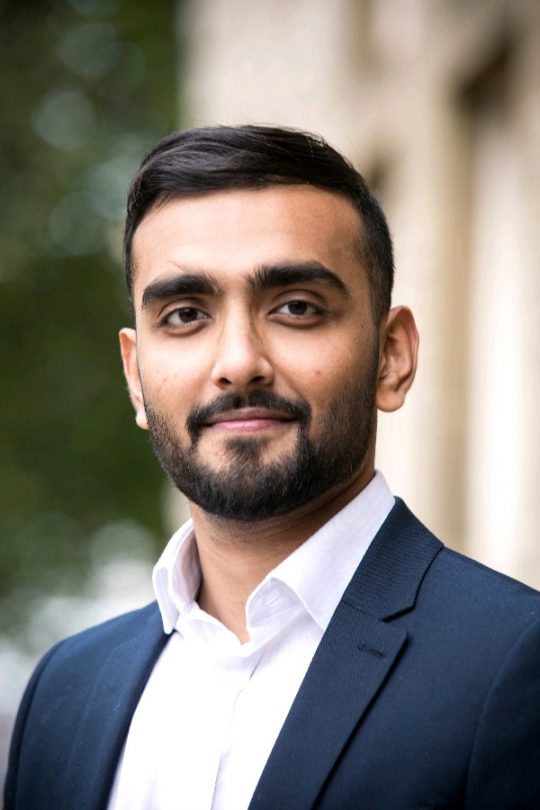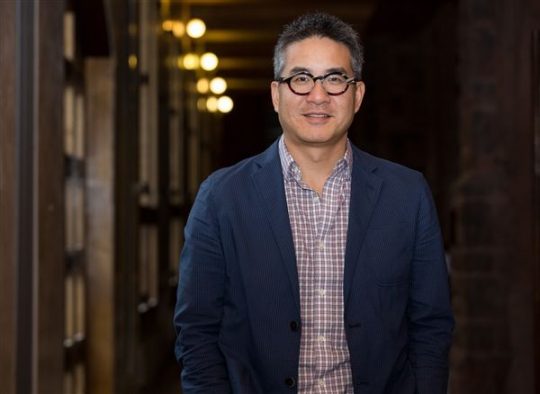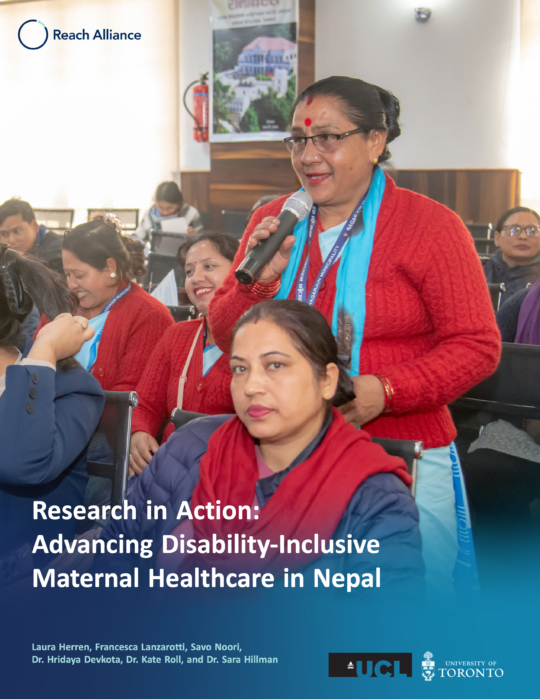Context in Brief
In summer 2019, researchers visited ITESO Universidad Jesuita de Guadalajara for two months to collaborate on the Digital Fabrication Laboratory (FabLab) project located in Cerro del Cuatro (often called “Cerro”). Cerro is a marginalized community in Guadalajara that has been deeply affected by drug-trafficking organization (DTO) operations. The collaboration aimed to examine the impact of FabLab on Cerro’s social fabric. However, unlike previous Reach case studies, our team’s fieldwork was not restricted to research and field interviews. We participated in designing, planning, and advising on the future of FabLab initiatives. This report provides an overview of findings from our field research and data collection.
Figure 1. Parroquia Nueva Santa Maria, the church in Cerro that houses the FabLab.
About FabLabs
As a part of the maker movement,1 FabLabs (digital fabrication laboratories) are spaces for community engagement, entrepreneurship, creativity, and education.2 With an open-door and open-source philosophy, FabLabs provide communities with access to flexible computer controlled tools for design, modeling, and fabrication. According to the Fab Foundation, an organization formed in 2009 to facilitate the growth of the FabLab global network, there are over 1,600 established FabLabs around the world, twenty-seven of which are registered in Mexico. In addition to supporting creative and educational development, FabLabs aim to provide a space in which solutions for community development and global challenges can be born and cultivated.
In 2018, the Nueva Santa Maria FabLab opened its doors to the Cerro community. Located in a church, la Parroquia de Nueva Santa Maria, this FabLab aims to strengthen Cerro’s social fabric by providing space for social, educational, and economic opportunities. The Nueva Santa Maria FabLab was established in partnership with ITESO and the community. As a Jesuit university with a mandate for supporting human rights and equality, ITESO has a long history of involvement in community development work throughout the city, particularly in low-socioeconomic status (SES) neighborhoods like Cerro.
Today, Cerro is a highly populated conglomeration of communities located on an inactive volcano in the northeast of Guadalajara, Jalisco, Mexico. In the 1980s however, it was unclaimed land on the outskirts of the city. A change in the law in Jalisco in 1992 allowed for the municipal government to sell certain land to private entities without titles. Throughout the early 1990s, a wave of land occupation took place as many individuals and families hurried to Guadalajara looking for economic opportunity and affordable land. With this new law, the government was keen to take advantage of the population influx. The government allowed people to settle on Cerro’s “public land” for a small affordable price. New residents began building settlements, investing in property, and developing businesses.
However, without titles, the community’s inhabitants never legally owned what they built. The combination of economically disenfranchised people trying to build and develop their livelihood and the government’s deceptive strategy for regulating land ownership created an environment that was extremely arbitrary in allocating land titles and government service provisions. This environment was ripe for corruption and political exploitation.
Figure 2. The undulating streets of Cerro. Gang presence increases as one travels uphill.
As a result, the settlements in Cerro del Cuatro were developed under very precarious and adverse conditions, largely outside of government regulation and support. Eventually urban growth within the downtown core of Guadalajara expanded into a greater metropolis. Cerro was absorbed through this process into the Greater Guadalajara Area (GGA). Given that the area was developed independently by community members without ownership and titles, the government could ignore its basic responsibilities to the inhabitants. Cerro was notably without public services and resources such as plumbing and electricity for almost twenty years and today its residents still face challenges with adequate garbage disposal, access to paved roads, etc. This lack of government support further marginalized the community and perpetuated people’s sense of abandonment there.
Taking advantage of the unstable and insecure environment, the New Generation Jalisco Cartel rooted its operations in Cerro.3 Given the lack of economic opportunity in the community andthe high levels of marginalization residents face, participating in cartel operations is often their only choice for survival. With such strong cartel influence, community members face cyclical violence and deep insecurity.
Since Cerro emerged outside of the government’s control and without city planning provisions, there is a noticeable lack of public spaces. In the community’s development, there were no parks for children to play in, no fields for sports, and no centers for community activities. As a result, youth have to find alternative ways to spend their time and often socialize on street corners, play in the grass medians of major roads, or participate in illicit activities. A lack of safe public spaces makes the youth highly vulnerable to cartel recruitment. This is a direct result of being constantly visible to cartel members as the streets have inevitably become the youths’ playground.
To help break this cycle of violence, insecurity, cartel influence, and lack of opportunity, ITESO has worked to support the development of safe public spaces and pathways to education and economic opportunity. In the past, ITESO partnered with Cerro to develop a number of community centers that provide activities for children after school.4 Most recently, ITESO has helped develop the FabLab to provide opportunities to youth and young adults in particular, with the aim of engaging them in creative and educational activities. By participating in the FabLab activities, community members can learn new technical and entrepreneurial skills and access opportunities to engage in society and the economy in a positive and safe way.
Observations from the Field
Social Fabric Among Youth in Cerro
Beyond the FabLab, there are three community centers in Cerro del Cuatro. All three aim to provide a free public space where young adolescents can socialize and form community bonds. The centers are not meant to replace schools but provide after-school activities for children ranging from ages four to fourteen.
Early childhood socialization plays a crucial role in the long term disengagement at a young age can affect actual and perceived safety as children grow older. Despite the lack of a broader social fabric in Cerro, the community centers are spaces where children can socialize and thrive. Forming meaningful connections is easy and natural for groups of children under the age of thirteen and inspired FabLab to consider the possibilities for other youths in the community.
However, teenaged youth are noticeably missing from the community centers. In Cerro teenagers are at a turning point when it comes to educational and employment opportunities. Many are recruited into cartels during these
years. They are at a vulnerable age and seeking financial independence, social acceptance, and community belonging.
ITESO social workers claim that, for many youths in the community, the cartel operations are not always perceived as negative. For some, cartel membership is a point of pride, a family business, their social circle, or a means out of poverty. These perceptions were solidified by ITESO students’ engagements with teenagers in the community centers: disengagement from cartel operations left teenagers with little or no social interaction opportunities within their community. This exemplifies a powerful truth about the social fabric of youth in Cerro—friendships, interactions,and other relationships are often conditional and disengagement has pervasive implications for an individual’s present and future.
Figure 3. Children from the community center on a field trip to the planetarium.
Active Participation in the FabLab
By June 2019, approximately 100 individuals had participated in and graduated from the FabLab’s program. The FabLab intended to use existing social networks within the community to increase levels of participation and increase participants’ satisfaction from the lessons. The general consensus among many participants is that they enjoyed the lessons but failed to grasp the linkages between their newly developed skills and future employment opportunities. Although not fully encompassing the possible reasons behind low levels of FabLab participation, this gap in application of the FabLab’s resources sheds light on one of its crucial limitations. Many members of the community know about the FabLab’s presence in the local church but few knew how they could benefit from it. It has thus become the FabLab’s goal to cultivate initiatives that will further understanding of how knowledge gained at the center might be used to people’s benefit.
ITESO’s Role
ITESO University was founded in 1957 as a Jesuit university with a community-oriented philosophy. Throughout its history, its approaches to community outreach programs have evolved toward a horizontal approach: focusing on integrating itself within the community to create lasting solutions rather than independently taking control of initiatives. This approach is vital because in the past communities relied too heavily on ITESO’s resources and leadership, in turn becoming dependent and complacent. An expert from ITESO who has worked on community projects extensively within Guadalajara described how many of the communities, especially those with lower socioeconomic status and marginalized residents, do not always recognize their own value. These communities often overlook their own knowledge base and are too quick to discredit their own experiences as a means of benefiting their own communities. ITESO attempts to curb and deconstruct this paradigm.
Many scholars and community practitioners have argued that, realistically, academic research and field study by outside professionals can assist communities only to a certain extent. The true determinant of their ability to become self-sufficient requires people using their own local knowledge to foster growth. In the case of the FabLab, this translates to the need to be self sustaining.
Active Reach
Beyond discovery and observations from the field, the research was supplemented by design and intervention components. With assistance from ITESO researchers, the FabLab conducted two pilots and one survey. The pilots examined operational sustainability and educational curriculum. The survey was designed to gauge the FabLab’s added value.
Operational Sustainability
The Case for Community Self-Sustenance
The FabLab operates under the direction of ITESO and CISAI.5 However, for its success and longevity, self-sustenance is crucial. The community in Cerro needs to be able to operate the FabLab without external support. Community-driven initiatives are certainly not a new concept. There is a vast literature surrounding community-driven development (CDD).6 As CDDs around the world increasingly secure improved development outcomes, ITESO has modeled their social interventions in a similar way. Beyond ITESO, the community itself has sought ownership in the FabLab’s operations.
ITESO and CISAI have collaborated with individuals in Cerro who have extensive networks within the community to manage the FabLab. There is a group of individuals in the church who have a vast social network. This group runs the day-to-day operations and has informally anointed themselves the Mesa Coordinadoras (translated to “board of coordinators”). The mesa has two ITESO-appointed members who want to eventually reduce their involvement in decision making. Similarly, the community members in the mesa believe that they need ownership of the FabLab for it to succeed and reach the disenfranchised youth who are the hardest to reach. These are not youth who live in a geographically inaccessible area but those who live in the middle of one of Mexico’s busiest cities. The traditional issues with service delivery do not apply here. The issue is not reaching the last mile—the challenge is to reach across the street to youth who do not have accessible safe public spaces. To do that, the community believes that youth need to see community success stories.
Predicated upon this need for community ownership,operational self-sustenance, and community success stories, the Reach team collaborated with ITESO researchers to create an operational structure and assisted with the design of two congruent pilots that were implemented by mesa members.
Capacity
The Nueva Santa Maria FabLab has three manufacturing machines: a laser cutter, a 3D printer, and a computer numerical control (CNC) router. The laser cutter is the most widely used machine. All of the courses conducted by ITESO and Feciar thus far have been training community members on how to create items with it.7
There are a few reasons for giving precedence to the laser cutter over the other two machines—namely, training time, safety, and manufacturing time. Both the 3D printer and CNC router operations require an exponentially lengthier training period. Leaders also fear the CNC router’s misuse could lead to accidents. Finally, the laser cutter has a faster manufacturing time so students don’t have to wait long periods for their items to be cut and printed.
Operational Model
Reach researchers proposed an operations model that divides FabLab operations into two broad “buckets”: (1) training and (2) maker space.
Reach and ITESO researchers collaborated tomdesign two pilot courses at the FabLab. The first trained potential FabLab facilitators. It was co-facilitated by a doctoral student conducting research on the relationship between augmented reality and its use in education. The facilitator co-conducted two sessions (three hours each over the course of two Saturdays) with four participants to acquaint them with Tinkercad (a 3D design software) and 3D printing. The introductory session covered the basics of Tinkercad in a conventional transactional pedagogical manner (teacher-to-student linear instruction). The second session was more interactive and aimed at designing and printing individual products using Tinkercad and a 3D printer.
Initially this intervention was supposed to rely heavily on the integration of augmented reality into the curriculum. However, because of some technical difficulties and a lack of Internet access in the first session, augmented reality curriculum could not be incorporated. In the second session,the participants voted against its usage since they wanted hands-on experience with the 3D printer but they followed up with a discussion around the possible integration of augmented reality at a later time. Although the intended objectives of the intervention were achieved successfully, it is still unclear whether augmented reality will be used further to train FabLab facilitators or participants. The second course was co-conducted by a former FabLab instructor to train ten participants in 3D printing over the course of four consecutivesessions lasting three hours each.
The second pilot built on the initial curriculum designed by Feciar for this particular FabLab. The introductory session of the four-day training focused on FabLab’s purpose and gave an overview of the remaining three sessions.
Figure 4. Decorative boxes created by community members at the FabLab.
The second and third sessions were based on learning technical skills, particularly the Inkscape design software. The participants were able to design, print, and engrave key chains by the end of the third session as a practice project. In the last session individual designs were translated into personalized products (for example, earrings, decorations, etc.) using a 3D printer and a laser-cutter machine. The course ended with a group picture as a token of motivation, confidence, accomplishment, and community development. This particular intervention aimed to enhance interactivity, creativity, self-expression, collaboration, and engagement.
Survey Design: How the Fablab Adds Value
Reach and ITESO researchers collaborated todesign a data collection tool that could gauge FabLab’s relevance for and impact on the community—a tool design that FabLab sought our engagement on. The proposed data collection tool includes two components: first, past-participant structured interviews and, second, surveys that could be embedded in course curriculum for future students. For the first part, we created an interview guide that would enable both qualitative and quantitative data to be collected. The team consulted with ITESO and University of Toronto faculty mentors to ensure the surveys were noninvasive and did not put any participants in danger.
Looking ahead at future participation in the FabLab, the value survey team created a survey that could collect information from participantsbefore their lessons began to understand their motivations in participating and their expected outcomes from the lesson. A similar survey will be conducted at the end of the course so the team can compare perceived and actual outcomes. As with the first set of past-participant interviews, the survey was created in collaboration with ITESO researchers and overseen by ITESO and University of Toronto faculty mentors to ensure that the participants bore no risk in answering survey questions. The surveys were created through Google Forms and were embedded in all of the FabLab’s computers. Throughout the year, the data will be automatically collected by the website and overseen by the value survey group. It will be available for future Reach teams and should enlighten the FabLab’s future progress.
Challenges to Reach
Contextual Variables
The challenges to the Cerro community are complex and pervasive, ranging from inadequate housing, abandoned/nonexistent government services, poverty, unemployment, health issues (including addiction), and violence—to name a few. Attempting to alleviate just one of the challenges is complex because they are interwoven with each other. These contextual challenges were directly observed in attempts to increase FabLab participation levels. When we tried to challenge narratives of disinterest in the program we came to realize that there were many variables at play. Some individuals did not have access to childcare and others could not afford to miss work. In any implementation of project initiatives, it’s crucial that facilitators systematically assess contextual variables affecting the community. Learning about the difficult realties
of people’s lives can lead to better reach.
Exogenous Support
Among the greater Guadalajara community— especially individuals, government bodies, and businesses—Cerro is stigmatized as not a “good” place to visit, conduct business, or live. These stigmas are rooted in many of the contextual variables that exist there. Stigma has significant implications, ranging from continued tension within the community and prevalent stereotypes that become intergenerational to decreased economic involvement within the community and lack of publicly supported welfare programs.
For the FabLab program to have long-term success it will need the greater Guadalajara community’s support, particularly for its economic development, so breaking down this stigma will be necessary. One of the most crucial aspects of the FabLab’s longterm success is its ability to cultivate partnerships with tech-centered businesses and organizations. Such partnerships could add to its educational program, creating possible internship opportunities and career pathways for the graduates.
Proving Longevity in a Community Used to Failure
Of the many social welfare programs introduced and implemented within the community, some ran successfully for short periods of time, some were cut short by changing municipal governments, and others failed entirely. Cerro residents and ITESO researchers described how many programs come and go through this space. Residents know to become involved in programs at the start, and prepare for them to be eventually taken away, essentially taking in the benefits while they have the chance. The community has become complacent about failure and abandonment. The challenge is to shift their assumptions away from
perceived eventual failure, and toward establishing longevity through their own contributions. The community becomes dependent on social programs’ facilitators to ensure their continued success. However, the only way to prove longevity in a community like Cerro accustomed to failure is to show people how their ability to succeed rests within their own hands, their own local knowledge, and their own collective determination.
Safe Integration
While the community faces a number of very significant challenges, it poses similar largescale challenges for researchers. Because safety is obviously a prerequisite to conduct research, researchers face three main risks to safe integration within the community:
- Fieldwork duration. Reach teams were in Guadalajara for two months to conduct field work. The two-month time frame offered the team opportunity to build networks and connections with individuals in the community. Researchers are primarily based at ITESOUniversity and occasional site visits were conducted to advise on the establishment of a physical mechanism for data collection.
- Risk to participants. Violence and distrust are inextricably interwoven into Cerro’s social fabric. Many residents revealed that they do not trust their neighbors. This distrust originates from their inability to discern who is involved with the local gangs or the dominant cartel in the region from those who are not. Residents and local experts also frequently pointed to the ubiquitous presence of alacones (gang lookouts) who keep an eye on suspicious activity that could potentially compromise drug-trafficking-organization (DTO) operations. These alacones are usually unassuming youth who are recruited with relatively high monetary compensation. The combination of distrust in their neighbors and the presence of alacones places the residents at a perceived risk for interacting with anyone from outside Cerro.
- Risk to researchers. Owing to the sensitivity of the research, we limited our research to the theoretical component of social fracture as a manifestation of the last mile. Researching cartel operations is therefore strictly out of the scope of research for safety reasons. ITESO is a trusted member of the community with pre-existing collaborations with the local community. Any interactions with the community are conducted exclusively ITESO University representatives. They have been repeatedly mentioned as one of the actors that the community trusts and that organized crime does not hinder. The same narrative exists regarding the church. Many hypothesize that this is because neither of the two have made any attempts to compromise criminal organizations’ operations in the area. Their attempts have solely been directed at the members of the community and atproviding welfare-related services.
Operationalizing Social Impact
Measurement and operationalization in Cerro are significant hurdles in researching the FabLab’s impact. Measuring the FabLab’s success as an intervention depends on its objectives. Currently, the objectives aim at attracting more community members to train on the machines. According to the patrons from ITESO though, the long-term goal is to use the intervention as a means of building social cohesion and rebuilding the social fabric. The FabLab is meant to be a safe public space in a physically safe location. The intermediate goal is to develop skills that participants can monetize. The overarching goal is to foster a collaborative environment during training sessions to provide community members (especially youth) with a place to meet, socialize, and work together. In other words, the FabLab’s objectives involve:
- attracting more students;
- rebuilding the social fabric of the community;
and
- increasing the opportunity costs of joining
DTOs by providing public space
Finding an indicator to measure success for the FabLab’s impact is difficult. With the exception of attracting more students, which can be measured directly by the number of enrollees, the other two are difficult to quantify. One of the methodsto quantify the impact on social fabric is to measure increase in social interactions within the community as a result of the FabLab. This could be done by extending surveys to new enrollees in the FabLab to gauge how many heard of the FabLab from alumni. This would indicate that alumni are having conversations about the space and encouraging others to join.
Next Steps
Our partnership with ITESO is not meant to be an isolated project. Reach, along with ITESO, intends on continuing the partnership through continued collaboration. Reach plans to send subsequent teams of researchers to continue research into ITESO-led social interventions in hard-to-reach communities in Guadalajara, Mexico. However, contingent on the nature of the progress made by prior teams of researchers, the objectives of each subsequent team will markedly differ. These objectives have to be divided into research and intervention objectives—an important distinction so that research efforts aren’t repeated and initial time investments (i.e., building networks) are minimized.
With this in mind our recommendations for the next steps for the 2020 Reach researchers are based on the work already concluded. In terms of research focus, we recommend that the next cohort focus on (1) creating low-risk data collection methodologies and (2) exploring successful community engagement strategies implemented in high-risk communities globally. In terms of interventions, we recommend that the next team focus on (1) reinforcing FabLab’s self-sustenance, (2) developing outreach to stakeholders outside of Cerro del Cuatro, and (3) increasing economic and social opportunities for alumni.
Research Objectives: Secure Data Collection and Alumni Interviews
Unlike traditional Reach projects, where secondary research heavily depends on the discovery phase, the FabLab teams will not have similar magnitudes of literature at their disposal. Even though semi-structured interviews are a major form of data collection in the community, there needs to be a more robust form of data collection that is academically rigorous. Thus, researchers will need to rely upon primary research in the form of systematized data collection. While this presents opportunities for assessing the impact of a particular social innovation in an at-risk community, it also presents a significant challenge. One of the primary challenges to conducting research in Cerro del Cuatro is security. Because the neighborhood is one of the most violent in all of Mexico, there are a variety of considerations to be accounted for in constructing the research design, namely: fieldwork duration, risk to participants, and risk to researchers.
The 2019 Reach team has identified effective methods to collect forms of data which could be implemented by the FabLab community, bearing in mind that
Reach’s objective is to identify the value the FabLab adds to the social fabric. Our methods include both structured and semi-structured interviews.
For structured interviews, we created a list of questions in consultation with ITESO students that could be used by the FabLab to gauge alumni feedback. This questionnaire aims to assess the value or benefit that alumni received. Bearing risk in mind, these questions preclude any mention of criminal organizations in order to decrease participant risk. We created these questions in collaboration with members of the community to make sure of what they would be comfortable answering.
For semi-structured interviews in Cerro del Cuatro to return robust emergent themes and data, there are two contingencies: the capacity to snowball and the frames of the question. To snowball from alumni, the researcher needs to gain trust. According to multiple community sources, Cerro is a closed community that doesn’t trust outsiders so traditional snowball methods are ineffective. To gain the trust of the participant alumni, it’s important how the researcher frames questions in Spanish. If you do not care about the question, they will not care about the answer.
Appendix A FanLab’s Staff Roles
- President
- The President’s Responsibilities are to:
- Supervise the business orders and production for FabLab.
- Collect the money from the Maker Space by the end of the week, and log it into account books.
- Collect the daily operations and revenue accounts and enter them into the master operations account book and the master revenue accounts book.
- Maintain master operations account book and master revenue accounts book.
- Write down total amount of expenses and income at the end of the month into the master operations accounts book and master revenue account book.
- Consult with the mesa to select and recruit managers, operators, and teachers.
- All of them are to be hired on a volunteer basis with machine credit as a reward.
- Deposit total income and revenue into one bank account and keep track of transactions.
- Consult with mesa and managers of Maker Space and Education to establish hours of operation (beyond Saturdays).
- Coordinate between Maker Space and Education departments to avoid conflict in scheduling.
- Operations
- Maker Space: FabLab will allow customers to print form the CNC router or laser cutter at a cost below market rate within regular hours of operation (see operations below).
- Manger | The Maker Space has the following responsibilities
- Maintain and write in the trading account book.
- Maintain and write in the entry book and egress.
- Keep points book for operators
- Create print and cut schedule.
- Assigning time to customers.
- Assigning time to operators.
- Collect cutting money to deliver to the president.
- Operators
- The Operator must have taken courses at the FabLab and be approved by the president and manager. They have the following responsibilities.
- Be present through hours of operation.
- Help customers cut.
- Collect the keys from the manager or president, open and close the FabLab for hours of operation, and return the keys to the manager or president.
- Maintain the machines during operating hours.
- Oversee the operation and entry-egress accounts and money during the hours of operation: must be delivered to the president or manager at the end of the day.
- Operators will receive thirty minutes of free cutting for every three hours of operations they operate.
- Education
- Manager | The Education Manager has the following responsibilities:
- Organize a minimum of one course for the laser cutter (three to five classes, depending on the difficulty) with twelve students every month.
- Courses ideally to be held on Saturdays and Sundays.
- Print diplomas for the course
- Organize logistics for the course.
- Create schedule and times for the course.
- Coordinate with the Master for the course.
- Conduct the recruitment for the course through WhatsApp, contacting community centers, and advertising in mass and social media.
- Organize a minimum of one “training the trainer” course every two months.
- The trainers from the “training the trainer” courses will become teachers for courses taught at the FabLab.
- Coordinate with ITESO contacts to help train the trainers.
- Maintain the master’s point book.
- Teachers
- The teachers have the following responsibilities:
- Conduct training sessions assigned by managers.
- Open and lock the computer room in the parish and hand over the keys to the managers after each class.
- Conduct the survey provided by ITESO at the beginning and end of the course.
- Teachers will receive thirty minutes of free cutting for every class that they teach (for example, two and a half hours for every five-class course taught).
- Managers select the teachers for each course they schedule.
Acknowledgments
This research was made possible by ITESO Universidad and through the Reach Alliance, a partnership between the University of Toronto’s Munk School of Global Affairs & Public Policy and the Mastercard Center for Inclusive Growth. Research was also funded by the Canada Research Chairs program; Ralph and Roz Halbert Professorship of Innovation at the Munk School of Global Affairs & Public Policy; and Mitacs. We extend our sincerest gratitude to Ruy Cervantes whose tireless dedication to the project is one of the primary reasons for its success. We thank ITESO Universidad Jesuita de Guadalajara, our primary partners in producing this report—without their support this report would not be possible. We specifically thank Eder Arteaga, Maria Paula Rivas and Marian Zainos for their diligent contributions to this report. We also express our gratitude and appreciation to those we met and interviewed in Mexico, alongside our ITESO student collaborators, survey respondents, and other university collaborators. Thanks to Kimberly Skead for her contributions to the research process and report. This project was approved by ITESO, in collaboration with the Reach Alliance.
This research was vetted and received approval from the Ethics Review Board at the University of Toronto.
MASTERCARD CENTER FOR INCLUSIVE GROWTH
The Center for Inclusive Growth advances equitable and sustainable economic growth and financial inclusion around the world. The Center leverages the company’s core assets and competencies, including data insights, expertise, and technology, while administering the philanthropic Mastercard Impact Fund, to produce independent research, scale global programs, and empower a community of thinkers, leaders, and doers on the front lines of inclusive growth.
MUNK SCHOOL OF GLOBAL AFFAIRS & PUBLIC POLICY
The Munk School of Global Affairs & Public Policy at the University of Toronto brings together passionate researchers, experts, and students to address the needs of a rapidly changing world. Through innovative teaching, collaborative research, and robust public dialogue and debate, we are shaping the next generation of leaders to tackle our most pressing global and domestic challenges.







